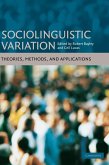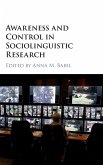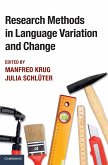This study of sociolinguistic variation examines the relation between social identity and ways of speaking. Studying variations in language not only reveals a great deal about speakers' strategies with respect to variables such as social class, gender, ethnicity and age, it also affords us the opportunity to observe linguistic change in progress. The volume brings together leading experts from a range of disciplines to create a broad perspective on the study of style and variation. Beginning with an introduction to theoretical issues, the book goes on to discuss key approaches to stylistic variation in spoken language, including such issues as attention paid to speech, audience design, identity construction, the corpus study of register, genre, distinctiveness and the anthropological study of style. Rigorous and engaging, this book will become the standard work on stylistic variation. It will be welcomed by students and academics in sociolinguistics, English language, dialectology, anthropology and sociology.
Table of contents:
Introduction John R. Rickford and Penelope Eckert; Part I. Anthropological Approaches: 1. 'Style' as distinctiveness: the culture and ideology of linguistic differentiation Judith T. Irvine; 2. Variety, style-shifting, and ideology Susan Ervin-Tripp; 3. The ethnography of genre in a Mexican market: form, function, variation Richard Bauman; 4. The question of genre Ronald Macaulay; Part II. Attention Paid to Speech: 5. The anatomy of style shifting William Labov; 6. A dissection of style shifting John Baugh; 7. Style and social meaning Penelope Eckert; 8. Zeroing in on multifunctionality and style Elizabeth Closs Traugott; Part III. Audience Design and Self-Identification: 9. Back in style: reworking audience design Allan Bell; 10. Primitives of a system for 'style' and 'register' Malcah Yaegar-Dror; 11. Language, situation and the relational self: theorising dialect-style in sociolinguistics Nikolas Coupland; 12. Couplandia and beyond Howard Giles; 13. Style and stylizing from the perspective of a non-autonomous sociolinguistics John R. Rickford; Part IV. Functionally Motivated Situational Variation: 14. Register variation and social dialect variation: re-examining the connection Edward Finegan and Douglas Biber; 15. Conversation, spoken language and social identity Lesley Milroy; 16. Style and the psycholinguistics of sociolinguistics: the logical problem of language variation Dennis R. Preston.
This volume brings together leading experts from a range of disciplines to create a broad perspective on the study of style and variation in spoken language. Beginning with an introduction to theoretical issues, the book goes on to discuss key approaches to stylistic variation.
Offers a broad perspective on the study of style and variation in spoken language.
Table of contents:
Introduction John R. Rickford and Penelope Eckert; Part I. Anthropological Approaches: 1. 'Style' as distinctiveness: the culture and ideology of linguistic differentiation Judith T. Irvine; 2. Variety, style-shifting, and ideology Susan Ervin-Tripp; 3. The ethnography of genre in a Mexican market: form, function, variation Richard Bauman; 4. The question of genre Ronald Macaulay; Part II. Attention Paid to Speech: 5. The anatomy of style shifting William Labov; 6. A dissection of style shifting John Baugh; 7. Style and social meaning Penelope Eckert; 8. Zeroing in on multifunctionality and style Elizabeth Closs Traugott; Part III. Audience Design and Self-Identification: 9. Back in style: reworking audience design Allan Bell; 10. Primitives of a system for 'style' and 'register' Malcah Yaegar-Dror; 11. Language, situation and the relational self: theorising dialect-style in sociolinguistics Nikolas Coupland; 12. Couplandia and beyond Howard Giles; 13. Style and stylizing from the perspective of a non-autonomous sociolinguistics John R. Rickford; Part IV. Functionally Motivated Situational Variation: 14. Register variation and social dialect variation: re-examining the connection Edward Finegan and Douglas Biber; 15. Conversation, spoken language and social identity Lesley Milroy; 16. Style and the psycholinguistics of sociolinguistics: the logical problem of language variation Dennis R. Preston.
This volume brings together leading experts from a range of disciplines to create a broad perspective on the study of style and variation in spoken language. Beginning with an introduction to theoretical issues, the book goes on to discuss key approaches to stylistic variation.
Offers a broad perspective on the study of style and variation in spoken language.








